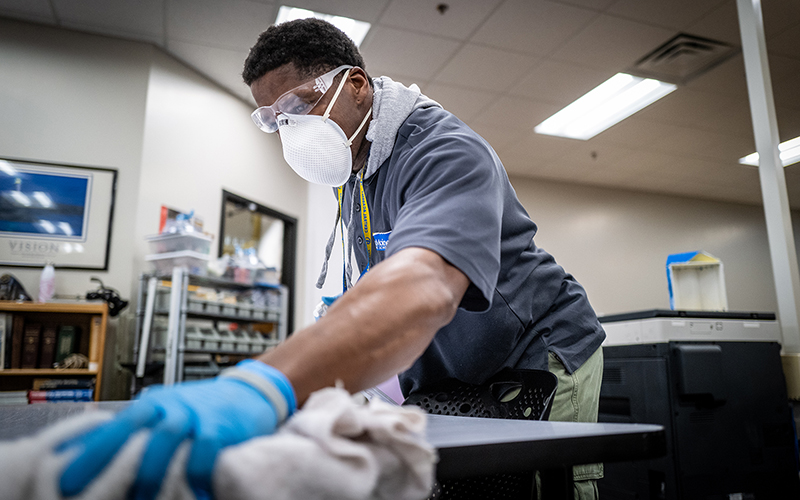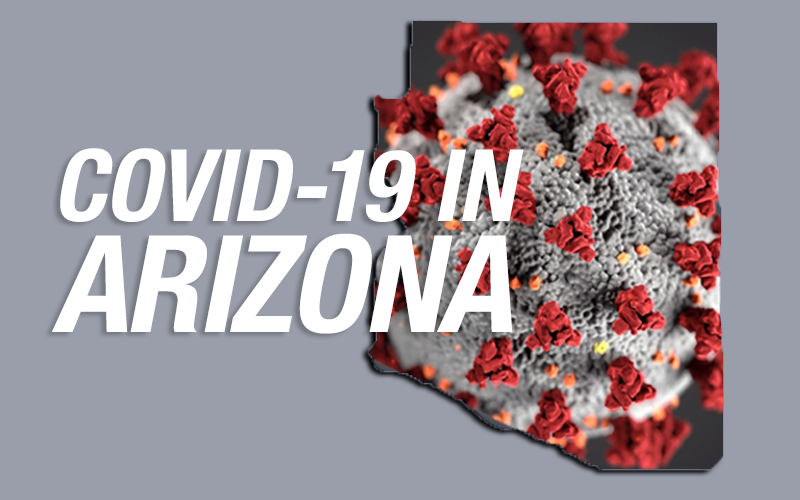WASHINGTON – Coronavirus-related deaths in Arizona passed 1,000 on Friday, as 16 new deaths brought the state’s total to 1,012 since the first death was reported in mid-March.
The grim milestone came as the number of new COVID-19 cases continued to soar in the state, with daily increases setting four records in the past week alone, according to Arizona Department of Health Services data. The latest record came Friday, when 1,579 new cases were added.
That brought the total number of confirmed cases in the state to 24,332 since the first case was discovered in late January, with more than one-quarter of the total number being recorded in the week from Friday, May 29, to Friday, June 5. And another 2,557 cases were added over the weekend.
The surging numbers gave some health officials concern. But Arizona Gov. Doug Ducey, who relaxed COVID-19 restrictions two weeks ago, said in a news conference Thursday that he is not planning to change course. Calls seeking comment from his office Friday were not immediately returned.
“I am confident that we’ve made the best and most responsible decisions possible, guided by public health the entire way,” Ducey said Thursday. “This virus is not going away.”
As of Sunday, June 7, the Arizona Department of Health Services reported 26,889 cases of COVID-19 and 1,044 deaths in the state. It said 393,246 tests for COVID-19 had been completed as of Sunday in public and private labs in Arizona, for a positive test rate of just over 6.8%.
But Dr. Marjorie Bessel, the chief clinical office for Banner Health, said Friday that she is concerned about the number of patients on ventilators trending upwards. Bessel said If these trends continue, Banner Health will soon need to exercise surge planning and flex up to 125% bed capacity.
She also said beds in intensive-care units are nearing 100 percent capacity, adding that hospitals “have seen an increase of the sickest of the sick.”
“There are steps the public needs to take to make sure we don’t exceed capacity,” Bessel said.
At Thursday’s news conference, Dr. Cara Christ, director of the state health department, said hospitals are seeing more non-COVID-19 use, as more people are feeling comfortable to seek medical care, which was expected following the state’s reopening.
Arizona Public Health Association Executive Director Will Humble didn’t say “I told you so” Friday, but he did remember noting after Memorial Day weekend, when some bars and public places were packed, that there was likely to be a spike in new cases in the coming weeks.
State Rep. Domingo DeGrazia, D-Tucson, said he was “disappointed but not surprised by higher rates of infection.”
“Experts told us this would happen if the state reopened without protections in place and the Governor did anyway,” DeGrazia said. He added that he is “confident” state residents can slow the spread of the virus by taking reasonable precautions, such as social distancing and wearing masks.
When Bessel was asked whether there is any indication that heat will kill off COVID-19, she said it is usually that coronaviruses decrease with hot weather, but that does not appear to be the case with this new novel coronavirus in Arizona and in hot-climate countries like Brazil.
Report: Arizona COVID-19 hospitalizations climb
COVID-19 hospitalizations in Arizona have increased in the past two weeks, one of just five states to see an increas in the period, Axios reported. The date from the COVID Tracking Project, a project of the Harvard Global Health Institute, said that ICU beds for COVID patients are reported at 375.
ASU unveils plans to return for fall semester
Arizona State University on Friday announced the school’s plans for a return for fall classes, with all ASU buildings to get cleaning before students arrive and deep classroom cleanings planned every day.
Employees and students will be required to wear a face covering while in ASU buildings and in outdoor community spaces where social distancing is not possible, under the plan.
If students who live on campus exhibit symptoms or test positive for COVID-19, isolation spaces will be provided with a complete suite of health care and food delivery services.
NAU plans in-early, out-early fall semester
Northern Arizona University announced this week that fall classes will begin earlier than usual and in-person classes will be finished by Thanksgiving. The shift aims to take advantage of lower transmission rates earlier in the year, and to keep students from going home for the holiday and then coming back to campus.
In a letter to students and faculty, NAU President Rita Cheng also said that health ambassadors will be present in high-traffic buildings to provide advice on appropriate distancing practices and to ensure these practices are adopted.
Hopi become first tribe to release cases by ZIP code
The Hopi tribe began releasing data on COVID-19 cases by ZIP code, the first tribe in the state to do so. The state health department has been providing case data by ZIP code for some time, but said it needed tribal permission to release data from tribal lands, the Arizona Republic reported Thursday.
The tribe reported 111 confirmed cases of the disease out of 1,361 tests administered as of Thursday.
Tolleson offers to test workers at meatpacking plant
Free COVID-19 testing started yesterday and will continue through Saturday for Tolleson residents and JBS employees, who work at the only meatpacking plant in Arizona.



